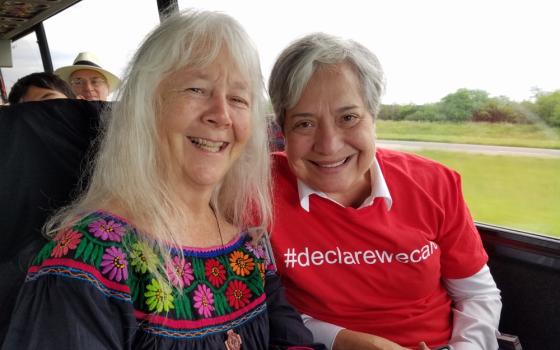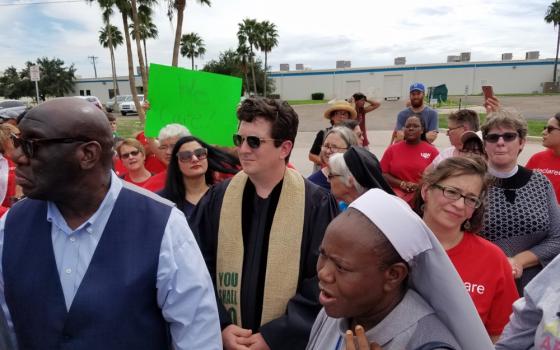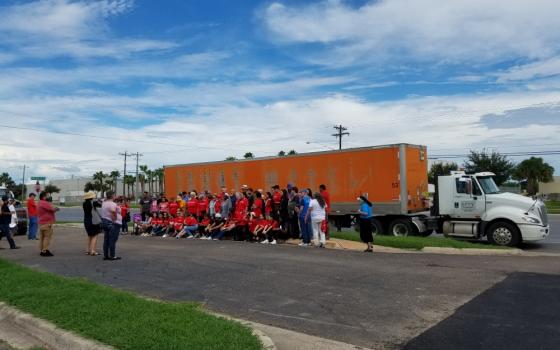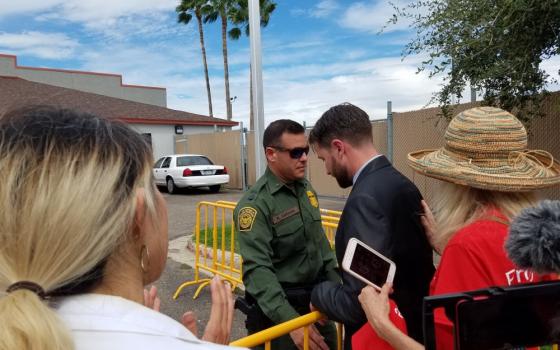"Desperate Jewish parents put their children on trains going to England to save them," said
Dr. Fernando Stein, past president of the American Academy of Pediatrics and a Medical Director in Texas Children's Hospital Baylor. He had spoken of his Jewish father who had escaped the Holocaust.
I who have taught a university class, "The Holocaust, Never Again," cringed as I listened to him and the others speaking on a panel sponsored by Project Lifeline. That project is trying to shine a light on the 134,526 refugee and immigrant children who were put in detention centers in 2017, after fleeing danger and hardship and seeking protection in the U.S.
It is not that I have not known about the immigrants, but I was overwhelmed as I heard Dr. Stein comparing the current lack of concern for the children to that dark chapter of European history in the 1930s and '40s.
While many people became aware of a few thousand immigrant children who were separated from their parents last summer, most people now do not realize the huge number of detained children and how this is contributing to the children's trauma. My eyes were opened when I hosted Hope Frye, an immigration attorney from the San Francisco area, who founded Project Lifeline.
For the last few years immigrant families who have been in the Karnes Detention Center arrive in our city of San Antonio almost every day, and the Mennonite Church under the leadership of Dr. John Garland — has been a main place that received them. As their numbers grew, we formed the Interfaith Welcome Coalition.
Teams of people welcome these international guests who have fled danger, asked at the U.S. border for asylum, and experienced the hardship of detention centers. Some of our sisters, not deterred by the fact that they are past 80, go out and offer warm and caring welcomes at the bus station.
Many convents, including ours, give mothers and children temporary shelter. Last time, we had a mother and her two year old son from Honduras; she told us about men coming to their home, killing her brother and beheading him. She took her little son and fled, traveling for a month and begging for help at our border.
Early the morning after the panel, we left in a caravan from our campus, the University of the Incarnate Word (UIW). We were about a hundred caring students, citizens of the city, and women religious including sisters of my community — Srs. Jean Durel, Jane Farek, Ramona Lopez, Feliciana Mejia, and Michelle O'Brien — and religious from other communities, Srs. Sharon Altendorf, Eucharia Gomba, Barbara Lambor Hagel and Julie Brady.
Sr. Norma Pimentel, the Director of Catholic Charities Rio Grande Valley, had come up to San Antonio to contribute to our panel and explain some of their daily work trying to help immigrants. On the bus I sat next to Sister Norma, and had a chance to learn more about how growing up there near the border in the Rio Grande Valley had prepared her for this challenging ministry which has been personally lauded by Pope Francis.
We had an 18-wheeler truck full of supplies for immigrants: food, blankets and clothing provided by donations from all over the U.S. In McAllen, Texas, we united with another caravan coming from Houston with more supplies for the immigrants.
Rev. Gavin Rogers, from Travis Park Methodist in San Antonio reaches out to the people who have to live in a park across from their church. He had invited anyone in his congregation to come on this caravan to help immigrant children. Four of the people without homes came on our bus and generously helped their pastor moving supplies as needed.
We knew that the plain unmarked building was Ursula Detention Center, holding hundreds of children who had come to our border seeking safety. As we approached, leading the way were faith leaders and physicians offering our services and supplies to help the children. We were Catholic, Methodist, Muslim, Presbyterian, Jewish, United Church of Christ, seasoned elders, shall children, various health care professional, students, concerned citizens of the neighborhood, and people who had flown here from across the U.S.
We were sisters who have helped to provide health care and services for immigrants and we are educators encouraging youth to learn to be good global citizens by knowing the Universal Declaration of Human Rights. Hope Frye in a reflection on the bus had helped us prepare us for this by visualizing the children and holding them in our hearts.
As we walked forward we sang "Everybody ought to know what loving is. Everybody ought to know what peace is." The officer who came out refused our service and our gifts. The elders among us were not surprised that this happened, but one of the students from the "Social Justice Leadership" class that I teach expressed how saddened he was by this response.
We want our voices to be joined by millions of voices: "We declare we care." The children have human rights. We the people respect these and we can help, we will help, we must help in the face of this humanitarian crisis. The students are spreading #declarewecare through social media.
Many times when I have been helping to guide our UIW students on immersion trips over fall break, we have stayed in the pilgrims' hotel at the Basilica of Our Lady of San Juan.* We have been there when the people of the church are hosting their annual "Immigrant Festival" with music, dance, food, fun and a special presentation honoring an "Immigrant Family of the Year." The people of this church recognize the hard work, knowledge, skills, and gifts that immigrants have brought to our country.
When our group of concerned citizens was turned away from the detention center, I knew that San Juan would be a comforting place for us to go. Fr. Jorge Gomez, the rector of San Juan, nodded in sad awareness when I told him what had happened to our group at the detention center. He explained to us with deep concern that about a hundred immigrants come to them every day seeking help. In the beautiful sacred space of the basilica, we looked up at the image of Mary, a mother, and prayed for all the children needing comfort.
The supplies we brought will be used for the many immigrants in this border area. Our caravan is over, but we are just beginning our cries to make it known that children are suffering in detention right now; we must throw out a lifeline.
* Correction: An earlier version of this column incorrectly stated the relationship with the Basilica and the Oblates of Mary Immaculate.
[Martha Ann Kirk, a Sister of Charity of the Incarnate Word, is professor of religious studies at the University of the Incarnate Word, San Antonio, and the author of Iraqi Women of Three Generations: Challenges, Education, and Hopes for Peace, based on her exhibit of photos and interviews.]




